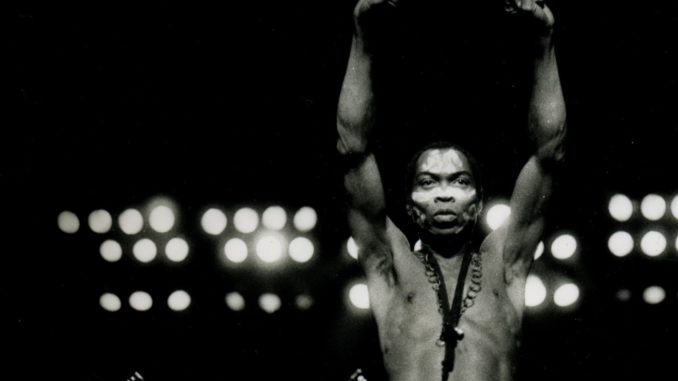
I strongly believe that the revolution that this nation seeks must start from the mind of millions of young Nigerians who make up more than 60 percent of the population…when…celebrities find the courage to speak truth to power like Fela did decades ago and like Vector is doing today, a revolution that will lead to national transformation might just be around the corner.
When words fail music speaks – Christian Andersen.
Twenty years after the Afro beat legend Fela Anikulapo Kuti passed on, his songs have continued to live on. Like a prophet with an unusual gift of clairvoyance, he made songs in the 1980s that are as fresh today as the morning dew. Fela stood up to constituted authority, challenged the establishment and advocated for an egalitarian society, where a young child born in Mushin will have the same opportunities as the one born in Victoria Island. He struggled for a society free from oppression, where the ‘haves’ would not trample on the rights of the ‘have nots’, but one in which all are equal before the law. It was, of course, unsurprising that Fela fanatically believed that an African man did not have the luxury to use music solely for entertainment but should rather as a tool for political struggle and liberation. He was spot on.
Sonny Okosun was another brilliant Nigerian artist who shared Fela’s doctrine. Okosun made protest songs and many on Pan-Africanism to the extent that his song, “Papa’s Land” became the de-facto anthem for the Rhodesians who were wrestling the British for independence. With hit songs like “Fire in Soweto” and “Which Way Nigeria”, Sonny Okosun used his songs to inspire a generation of Africans in the late 70s and 80s to free themselves from oppressive regimes and corrupt governments.
Very few things fire up a weary heart like a powerfully written song, as the melodies capture our minds and gain absolute control of our subconscious. It subtly influences behaviour and nudges one to take unintended actions. Little wonder why when Michael Jackson wanted to draw the attention of the world to children who were suffering from hunger and diseases, he released a powerful song, “Heal the world”. It is for this same reason that countries compose national anthems that are sang regularly to reinforce the spirit of patriotism. If anyone is still in doubt of the tremendous influence songs have on human behaviour and the catalytic role they play in fueling revolutions, he should look no further than the role played by “Nanga Abahutu” (“I hate Hutus”) sung by Rwanda’s then most popular musician, Simon Bikindi and the devastating violence that followed after.
In a short but thought-provoking song, Vector carpets the government for failing its people and leaving them with a false sense of hope that the land is green on the other side of the Mediterranean. In his words: “If you made it easy guys won’t have to travel, now we worry about bodies buried under the gravel, but that na even if them see dem bury”.
Only a few days ago, after CNN broke the story of the Libyan slave trade alongside the online campaign to end SARS (the dreaded anti-robbery squad), Nigeria’s top rapper, Vector, found the voice of reason that we all thought had died with Fela. In a short but thought-provoking song, Vector carpets the government for failing its people and leaving them with a false sense of hope that the land is green on the other side of the Mediterranean. In his words: “If you made it easy guys won’t have to travel, now we worry about bodies buried under the gravel, but that na even if them see dem bury”. He goes on to throw his weight behind the #EndSARS campaign and urges the government to do more that pay lip service to burning national issues.
I strongly believe that the revolution that this nation seeks must start from the mind of millions of young Nigerians who make up more than 60 percent of the population. These young Nigerians are no longer influenced by the books of Wole Soyinka or the poems of Achebe, rather they are largely influenced by the music they listen to and the celebrities they follow on social media. Hence, when these celebrities find the courage to speak truth to power like Fela did decades ago and like Vector is doing today, a revolution that will lead to national transformation might just be around the corner.
Ayodele Adio is co-host of a Lagos radio programme.
END

i concur